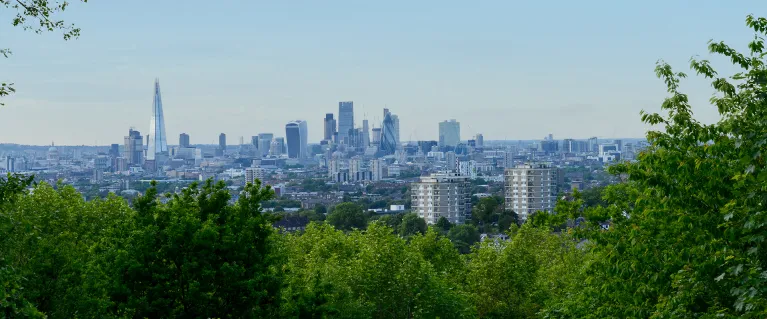
ULEZ Facts
Every London borough exceeds the World Health Organization guideline limits for air pollution.
Expanding the Ultra Low Emission Zone (ULEZ) across all London boroughs is part of the Mayor’s approach to tackling the challenges of:
-
toxic air pollution
-
the climate emergency
-
traffic congestion.
Here are the facts about the ULEZ.
Pollution levels
Every London borough exceeds the pollution guideline limits recommended by the World Health Organization.
Health
Expanding the ULEZ is expected to have important health benefits.
Air pollution is a public health crisis – our children are growing up with stunted lungs and it is linked to a host of serious conditions, from heart disease to cancer and dementia.
Imperial College London, globally renowned experts in air quality research, have looked at the health burden of air pollution in London. Their research in 2019 found that toxic air contributed to the premature deaths of around 4,000 Londoners. This includes deaths from all causes, including respiratory, lung cancer and cardiovascular diseases.
Air pollution hits the poorest communities and Black, Asian and minority ethnic communities the hardest.
Around 480,000 Londoners have been diagnosed with asthma and are more vulnerable to the health impacts of air pollution, with more than half of these people living in outer London boroughs.
If no additional action is taken to reduce air pollution, the cumulative cost to the NHS and social care system attributable to air pollution is estimated to be £10.4bn by 2050.
Vehicles
Nearly 97 per cent of vehicles seen driving in London already meet the ULEZ standards.
The ULEZ is a very targeted scheme, and only affects a small minority of drivers. 96.7 per cent of vehicles seen driving in London on an average day now meet the ULEZ emission standards. This means that the vast majority of drivers are not affected by the ULEZ and do not need to pay the daily charge.
Nearly half of London households do not own a car but are disproportionately feeling the damaging consequences that polluting vehicles cause.
Investments
Any net revenue raised by the ULEZ is reinvested in running and improving the transport network in London.
This includes planned transport enhancements in outer London, for example the brand new Superloop bus network.
Within just a few years, there will be no net revenue from the ULEZ expansion. Net revenue is projected to stop by 2027 as more people switch to cleaner, greener modes of transport.
Air quality
The central and inner ULEZ has already improved air quality for four million Londoners and the London-wide ULEZ is bringing cleaner air to five million more.
All ULEZ policies in total have had a dramatic impact on improving air quality across the capital. Harmful roadside NO2 concentrations are estimated to be:
-
54 per cent lower in central London than they would have been without the ULEZ and its expansions.
-
29 per cent lower in inner London than they would have been without the ULEZ and its expansions.
-
24 per cent lower in outer London than they would have been without the ULEZ and its expansions.
London is now on track to reach legal air pollution levels within the next year, 184 years earlier than previously projected.
The London-wide ULEZ has reduced the number of non-compliant vehicles by over half.
There are nearly 100,000 fewer non-compliant vehicles seen driving in London on an average day since June 2023, which is a reduction of 58 per cent.
Across London, 96.7 per cent of vehicles seen driving on an average day now meet the ULEZ standards. This is up from 37 per cent in 2017, when changes associated with the ULEZ began.
Scrappage scheme
In January 2023, the Mayor-funded scrappage scheme launched, providing financial assistance to help more eligible Londoners scrap their non-compliant vehicles.
Scrappage scheme support was initially targeted at low-income and disabled Londoners with eligible non-compliant cars, motorcycles and wheelchair accessible vehicles (WAV), and London-registered sole traders, micro businesses and charities with eligible non-compliant vans or minibuses.
The scheme was later expanded to cover all Londoners with eligible non-compliant cars, motorcycles and WAVs and small businesses with eligible non-compliant vans and minibuses.
From March 2024, an option was added for successful scrappage scheme applicants to choose to donate vehicles to support humanitarian and medical needs in Ukraine instead of scrapping them, and still receive the same grant payment.
Following the decline of application volumes and high measured compliance with the ULEZ standards, the scrappage scheme closed to new applications on 8 September 2024. A full evaluation of the scrappage scheme will be published in spring 2025.
To mitigate a potential impact of the closure of the scrappage scheme, the temporary exemption for not-for-profit minibuses was extended by two years to 24 October 2027. The third-party offers ended on 8 November 2024, two months after the closure of the scrappage scheme.
Exemptions
There are a number of temporary exemptions for anyone driving in London.
Some drivers and vehicles qualify for a temporary 100 per cent discount from the ULEZ.
Vehicles with a ‘disabled’ or ‘disabled passenger’ vehicle tax class are automatically exempt from paying the ULEZ charge until 24 October 2027. Check the TfL website for more details.
People in receipt of certain disability benefits and those who use Wheelchair Accessible Vehicles are also eligible for a temporary exemption. You need to register with TfL for these temporary exemptions.
Read for a full list of discounts and exemptions, and whether you or your vehicle are eligible.